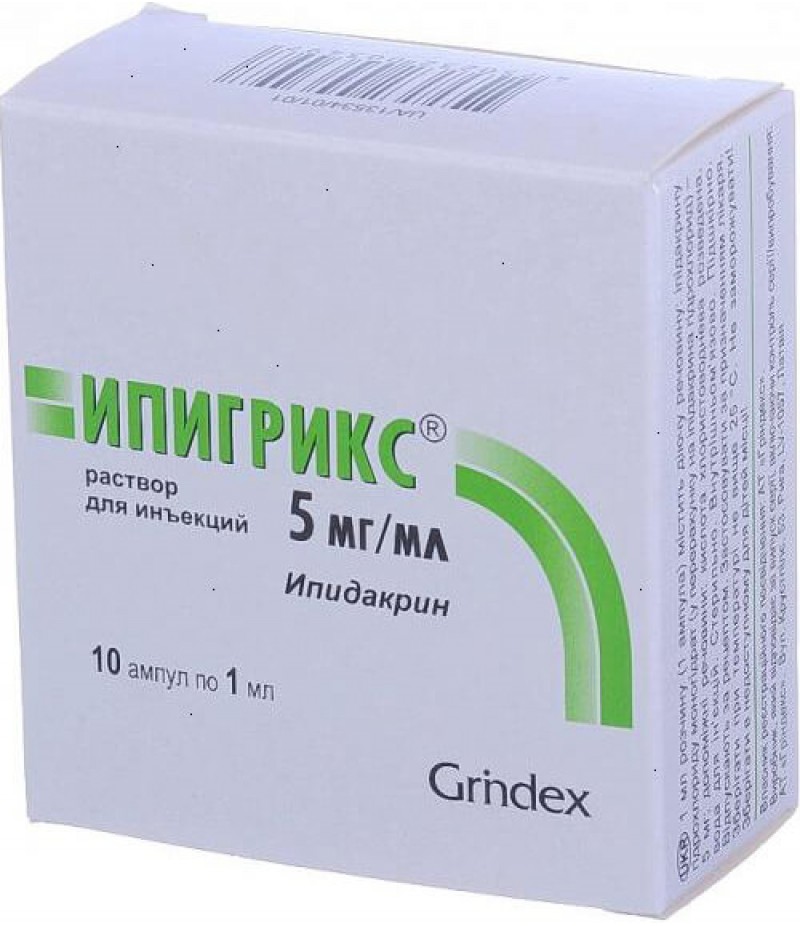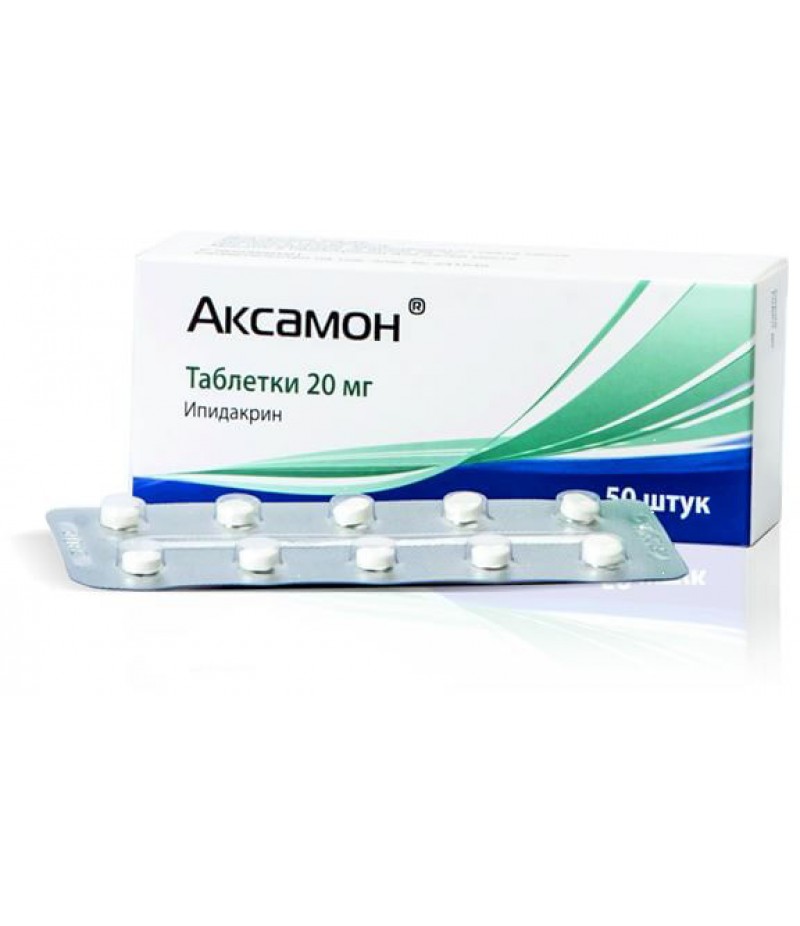Ipigrix solution 5mg/ml #10
- $48.43
- 2 or more $47.80
- 3 or more $46.90
- Availability:In Stock
Ipigrix user manualYou can buy Ipigrix hereRelease form, composition and packagingThe solution for the / m and s / to the introduction of a transparent, colorless.1 mlipidacrine hydrochloride monohydrate 5.4 mg,which corresponds t..
Tags: solution
Ipigrix user manual
You can buy Ipigrix here
Release form, composition and packaging
The solution for the / m and s / to the introduction of a transparent, colorless.
1 ml
ipidacrine hydrochloride monohydrate 5.4 mg,
which corresponds to the content of ipidacrine hydrochloride 5 mg
Excipients: 1M hydrochloric acid solution - to pH 2.8-4.0, water d / and - up to 1 ml.
1 ml - ampoules of colorless glass (5) - plastic cell packs (2) - cardboard packs.
pharmachologic effect
Ipidacrine is a reversible inhibitor of cholinesterase. Directly stimulates the conduction of impulses in the CNS and neuromuscular synapses, blocking the potassium channels of the membranes. Enhances the effect on smooth muscles not only of the mediator acetylcholine, but also of adrenaline, serotonin, histamine and oxytocin.
Main pharmacological effects of ipidacrine:
- restoration and stimulation of neuromuscular conduction;
- restoration of impulse conduction in the peripheral nervous system after blockade caused by certain factors (for example, trauma, inflammation, the action of local anesthetics, antibiotics, toxins and potassium chloride);
- increased contractility and tone of the smooth muscles of the internal organs;
- specific moderate stimulation of the CNS in combination with individual manifestations of sedative action;
- memory improvement.
The therapeutic effect is manifested 15-20 minutes after parenteral administration. The duration of Ipigrix is 3-5 hours.
In preclinical studies, ipidacrine had no teratogenic, embryotoxic, mutagenic, carcinogenic, or immunotoxic effects, and did not affect the endocrine system.
Pharmacokinetics
Suction and distribution
After oral administration, ipidacrine is rapidly absorbed from the gastrointestinal tract. Cmax in plasma after sc or i / m injection is achieved within 25-30 minutes. About 40-55% of the active substance is bound to plasma proteins.
Ipigrix penetrates through the BBB. Ipidacrine rapidly enters the tissues, only 2% of Ipigrix is found in the plasma in the equilibrium state.
Metabolism and excretion
Ipigrix is metabolized in the liver. Excretion of ipidacrine is carried out by the kidneys and through the intestines, excretion with urine predominates. T1 / 2 ipidacrine is 40 minutes. After parenteral administration, 34.8% of the administered dose of ipidacrine is excreted unchanged in the urine. This indicates a rapid metabolism of Ipigrix in the body.
Indications for Ipigrix
- diseases of the peripheral nervous system (neuritis, polyneuritis, polyneuropathy, polyradiculopathy, myasthenia gravis and myasthenic syndrome of various etiologies);
- diseases of the central nervous system (bulbar paralysis and paresis);
- the period of convalescence after organic lesions of the central nervous system, accompanied by motor impairment.
Contraindications
- epilepsy;
- extrapyramidal disorders with hyperkinesis;
- angina pectoris;
- severe bradycardia;
- bronchial asthma;
- vestibular disorders;
- exacerbation of gastric or duodenal ulcers;
- mechanical obstruction of the intestine or urinary tract;
- pregnancy;
- breastfeeding period;
- children's and teenage age till 18 years (there is no systematized data on safety of use);
- Hypersensitivity to ipidacrine and / or any of the excipients of Ipigrix.
Precautions should be prescribed Ipigrix for gastric ulcer and duodenal ulcer, thyrotoxicosis, cardiovascular diseases, as well as patients with obstructive respiratory diseases in history or acute respiratory diseases.
Dosage
Ipigrix is used in the / m or s / k.
Doses and duration of treatment are determined individually depending on the severity of the disease.
Peripheral nervous system diseases
With mono-and polyneuropathy of various origins: n / a and in / m 5-15 mg 1-2 times / day; a course of 10-15 days (in severe cases, up to 30 days); then move to taking ipidacrine tablets.
In myasthenia and myasthenic syndrome: n / a and i / m 5-30 mg 1-3 times / day; then move to taking ipidacrine tablets. The general course of treatment is 1-2 months. If necessary, treatment can be repeated several times with a break between courses of 1-2 months.
CNS diseases
When bulbar paralysis and paresis: n / a and v / m 5-15 mg 1-2 times / day, the course of 10-15 days; then move to taking ipidacrine tablets.
During the rehabilitation period with organic lesions of the central nervous system: in / m 10-15 mg 1-2 times / day, a course of up to 15 days; then move to taking ipidacrine tablets.
Side effects
Ipidacrine is usually well tolerated. Side effects are mainly associated with the stimulation of m-cholinergic receptors.
The side effects of ipidacrine listed below are classified into groups of systems and organs, indicating the frequency of occurrence: often (from ≥1 / 100 to <1/10), infrequently (from ≥1 / 1000 to <1/100), rarely (from ≥1 / 10,000 to <1/1000).
On the part of the digestive system: often - hypersalivation, nausea; infrequently - vomiting; rarely - diarrhea, epigastric pain; frequency is unknown - dyspepsia.
On the part of the nervous system: infrequently - dizziness, headaches, drowsiness, muscle spasm, weakness.
Since the cardiovascular system: often - heartbeat, bradycardia.
On the part of the organ of vision: the frequency is unknown - miosis.
On the part of the respiratory system: infrequently - an increase in bronchial secretion, bronchospasm.
From the musculoskeletal system: frequency is unknown - tremor, convulsions.
From the skin and subcutaneous tissue: often - sweating; rarely - allergic reactions (itching, rash), usually when using large doses of Ipigrix.
Other: unknown frequency - hypothermia, chest pain, jaundice, increased uterine tone.
When these side effects appear, as well as when a side effect occurs that is not mentioned in the instructions, the patient should consult a doctor.
Overdose
Symptoms in severe overdosage may develop cholinergic crisis (decreased appetite, bronchospasm, lacrimation, sweating, pupillary constriction, nystagmus, hyperperistalsis gastrointestinal tract, spontaneous defecation and urination, vomiting, jaundice, bradycardia, impaired intracardiac conduction, arrhythmia, hypotension, anxiety , anxiety, arousal, fear, ataxia, convulsions, coma, speech disorder, drowsiness, general weakness).
Treatment: carry out symptomatic therapy, apply m-anticholinergic substances (including atropine, cyclodol, metacin).
Drug interaction
Ipidacrine reduces the inhibitory effect on the neuromuscular transmission and conduction of excitation along the peripheral nerves of local anesthetics, aminoglycosides and potassium chloride.
Sedative effect of drugs that inhibit the central nervous system, including ethanol, as well as the effect of other cholinesterase inhibitors and m-cholinomimetics under the influence of ipidacrine are enhanced.
With the simultaneous use of other cholinergic drugs ipidacrine increases the risk of a cholinergic crisis in patients with myasthenia.
Beta-blockers enhance the severity of bradycardia caused by ipidacrine.
Cerebrolysin potentiates the effect of ipidacrine.
Ethanol enhances the unwanted side effects of ipidacrine.
Ipidacrine can be used in combination with nootropic drugs.
special instructions
At the time of treatment should refrain from drinking alcohol, which increases the side effects of ipidacrine.
Ipidacrine can exacerbate the course of epilepsy, as well as increase the negative effect of alcohol on the body.
In patients with depression, ipidacrine may increase the onset of symptoms of depression.
In connection with the possible risk of bradycardia when using ipidacrine, cardiac activity should be monitored.
Use in Pediatrics
There are no systematic data on the use of children.
Influence on ability to drive vehicles and mechanisms
Ipidacrine may have a sedative effect, so patients exposed to this effect when using Ipigrix, should be careful when driving and working with mechanisms.
Pregnancy and lactation
Ipidacrine enhances the tone of the uterus and can cause premature labor, so Ipigrix is contraindicated during pregnancy.
The use of ipidacrine during breastfeeding is contraindicated.
Use in childhood
Ipigrix is contraindicated in children and adolescents under 18 years of age (there are no systematic data on the safety of use).
When kidney damage
Ipigrix is contraindicated in case of mechanical obstruction of the urinary tract.
Pharmacy sales terms
The prescription is not required to buy Ipigrix.
Terms and conditions of storage
Ipigrix should be stored out of the reach of children at a temperature not higher than 25 ° C; do not freeze. Shelf life - 2 years. Do not use after the expiration date printed on the package.


